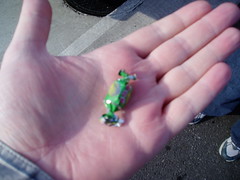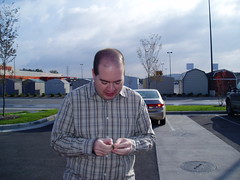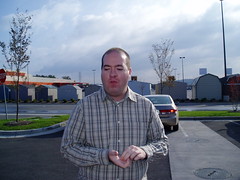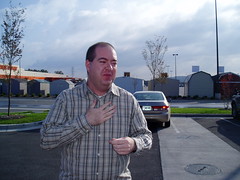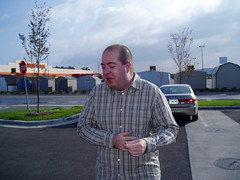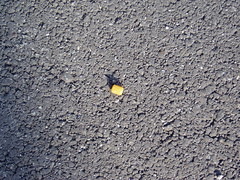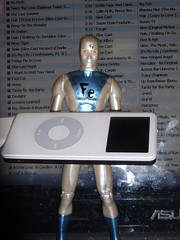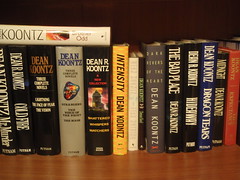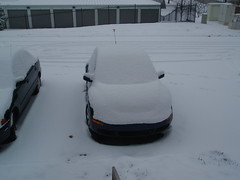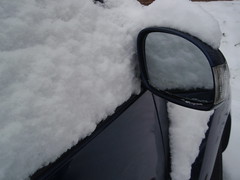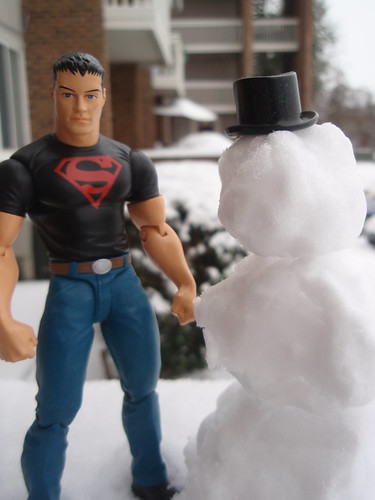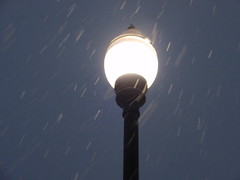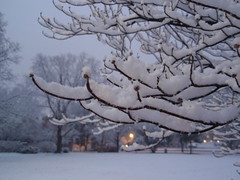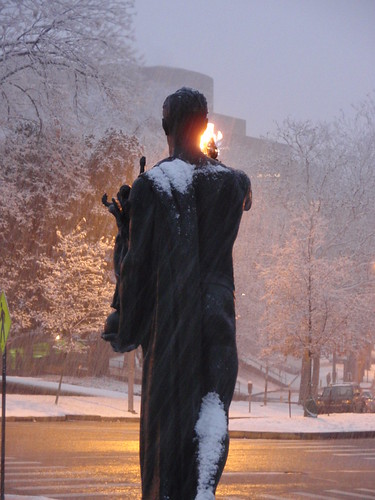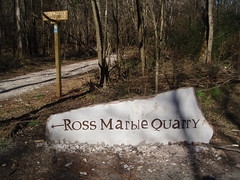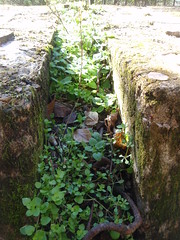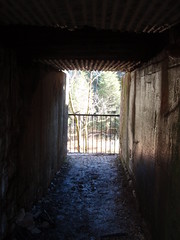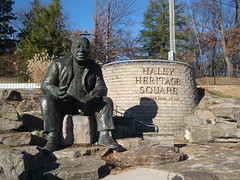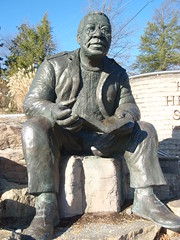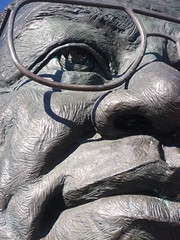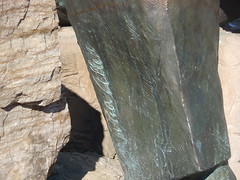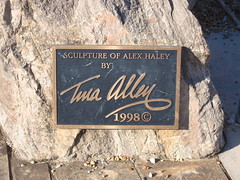With about three hours to spare, I managed to meet my reading challenge to myself for 2010 and read 52 books this year. 2010 marked my fifth year in a row setting this goal, and only the second one when I actually reached it.
This year I used the same rules as
last year: Cookbooks don't count, because I don't so much read them as I do skim and fantasize. I also, for the most part, don't count graphic novels and collected editions of comic books, because I read so many of them that it would artificially inflate my tally. I'll make an exception to either rule if I read something that I think is really outstanding, but other than that I don't use any other rules. The year that I decided that I had to alternate between fiction and nonfiction was kind of a disaster, so I don't use any selection criteria, either.
That said, here's my tally for 2010:
1/52: Matthew Pearl's
The Poe Shadow deals with a young lawyer investigating the strange death of Edgar Allan Poe in Baltimore in the 1800's. At first it seemed a little cluttered and slow with side plots and weird situations, but eventually I realized that Pearl kind of cleverly inserts his narrator into a story right out of Poe with murders, mistaken identities, trips to prison, and a multi-layered plot that had nothing to do with what it seemed to at first. Pearl also bases the entire thing on facts and research that he painstakingly recounts in the afterward.
2/52: I picked up Rick Riordan's
The Lightning Thief because I saw all these previews for the movie over Christmas break and my friend Sean raved about what a good book it is. It details the quest of young Percy Jackson, who discovers that he is the son of a Greek god and gets sent to a summer camp with a bunch of other demigods before he ends up on a quest to find and return Zeus' stolen thunderbolt before the gods get into a war with each other. It's not a bad book once you get past the whole, "I'm reading at a sixth grade level" factor, and the average person could probably plow through it in a couple hours. I kept meaning to read the rest of the series, but didn't get started on that until the very end of the year.
3/52: Someone on a gossip message board that I read recommended Marcel Theroux's
Far North, so I requested it from the library. Set in Siberia in the closing days of human civilization, it follows a young woman named Makepeace who is the sheriff of her town and also the last person living there. Theroux is never clear on how far in the future this is or what the exact disaster was, but there are shades of war, climate change, and pestilence mixed into the narrator's reflections. The book is a multi-year chronicle of her wandering across the northern edge of the world after witnessing a plane crash, as she goes in search of the people who have rebuilt enough of civilization to fly a plane. Overall, it's kind of like "The Road", but less depressing. It's not like that's a real stretch to accomplish, though.
4/52: I reread Robert. R. McCammon's
Mine, a fast paced story of motherhood and murder. Mary Terror, a 60's radical and former Weather Underground member who has been in hiding since most of her cell died in a shootout with the feds, resurfaces long enough to steal society columnist Laura Clayborne's baby at random, convinced that the survivors of her cell are reuniting and determined to bring her leader, Lord Jack, a baby to replace the one she lost decades before. Laura, determined to get her baby back, chases Mary through a web of ex-hippies and across the country, from Atlanta through Rock City and Colorado blizzards and dinosaur theme parks until their final confrontation. I like this book, but it makes me sad. It's not so much about giving up your dreams as it is about what it costs you to hold onto them. Like most of McCammon's books, it is out of print, but I see copies at the used bookstore all the time.
I was also excited to reread this because the other times I've read it, when I lived in New York, I never knew that Rock City was a real place, but it is, and I was excited because I've been there:
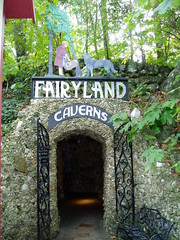
It's a fun yet sometimes creepy afternoon, like so many places I visit in Tennessee.
5/52: David Levithan's
Wide Awake takes place in the near future, the morning after the election of America's first gay, Jewish president, and follows Duncan Weiss, a gay teen who volunteered for the winning campaign, as he watches everyone around him react to the news. The same day, the Governor of Kansas demands a statewide recount, jeopardizing the election, and Duncan allows his activist boyfriend to convince him to join a mass gathering in Topeka to protest. While I found the ideas interesting, and the struggle of deciding when to take action for the things you believe in rather than just believing them, the characters were a little uneven. Duncan and Jimmy's relationship is shaky for the whole book, but there's never any indication of why, and when they suddenly decide they're fine at the end and that they really do love each other it's kind of an anti-climax since you were never sure what was wrong to begin with. It was a good book overall, though, and made me wonder if I'm doing enough to support gay rights.
6/52: E.B. Mawr's
Romanian Fairy Tales and Legends was the first book for the international book club I joined on campus. I read it in one night, and while it was kind of interesting, I'm not sure if something was lost in translation or if I don't know enough about the Romanian culture because I couldn't figure out what the moral of some of the stories was. The discussion at Book Club didn't really clarify, either, as everyone was like, "I kind of didn't get this story" and the facilitator was like, "Yes, that happens." I did enjoy the story about Vlad the Impaler, though, even if the guy leading the book discussion tried to stess repeatedly that Romania is about more than just Dracula, right before he recommended that we also read
The Historian, a book about Dracula.
7/52: I wasted almost all of March forcing myself through
Under the Dome, and I think I might actually hate Stephen King even more than I did after I read
Dreamcatcher, the novel with 40 graphic pages of someone pooping out an alien worm. The main reason I had trouble with this book and couldn't read more than ten pages at a time most of the time was that there is absolutely nothing new here. It's the same plot as
The Simpsons Movie, through the lens of "Twilight Zone" episode
Stopover in a Quiet Town. The character development is straight out of
Lord of the Flies, so much so that at one point one of the characters even compares their situation to that book, and the climax is the end of
The Stand. There's nothing new here, and while I don't mind rereading a book I enjoyed I'd rather reread it as the original book, not another in the line of self-derivative auto-cannibalism King has produced for the past few years.
For the next few weeks, I descended into madness. Way back in
2009 I read Stephenie Meyer's
Twilight, and hated it, but a group of friends on another message board decided that we all needed to read the rest of the series, so I did, and mostly all I can say is that Stephenie Meyer is batshit crazy, but she got published and is now a multimillionaire while I haven't written anything but blog posts for years now, so maybe I shouldn't judge.
Anyway:
8/52: Stephenie Meyer's
New Moon was even worse than the first book. At the end of the first one I was annoyed because the whole book builds to a fight that happens offscreen, but this one is even worse because the whole book builds to a fight... and then there is no fight. AT ALL. This book has no plot. There's no climax. What a steaming pile of crap this was. On the bright side, Rosalie is hilarious. "Oh, hey Edward? Your worthless human girlfriend is dead. Seriously. No one else wanted to tell you, but I couldn't dial the phone fast enough. Have a super day, bro!" And then nobody even calls her on it! She's just like, "Oh, yeah, sorry. I'm a bitch," and everyone completely ignores that she dicked around with her suicidal brother on purpose!
9/52: Stephenie Meyer's
Eclipse was definitely a book. At least this one actually had a fight. It only took Meyer three books to actually show one instead of just talking about it. Too bad the rest of it was an awful, depressing mess of "Bella fills out college applications but doesn't want to", "Bella loves two boys, but three boys are still fighting over her", "Bella's dad is a shitty parent", and "Bella still has no idea what she wants with regard to boys, her life, or her future". Is being a teenage girl actually this angsty and depressing?
10/52:
Breaking Dawn is the book where Meyer totally went off the rails. People keep telling me that these books are a beautiful story of romance, but beautiful stories of romance rarely include vampire babies that are conceived under an implied veil of sexy domestic abuse and that proceed to claw their way out of the mother in a blood-drenched pelvis-fracturing spine-snapping birth scene where one by one her adoptive family abandons her because they can't stay in the room with so much of her delicious blood shooting out. And then, to top it all off, OF COURSE Bella ends up being the rarest most amazing most special vampire ever. I'm shocked that Meyer could manage to write this at all while masturbating so feverishly over her own vampire boyfriend creation.
Also, I can't wait for the movie.
11/52: I didn't know that Dominick Dunne finished another novel before his death, so I was excited to see
Too Much Money and bought it immediately, even more excited to see that it is a sequel to
People Like Us, my favorite of his novels. I thought that Dunne might have retired from fiction, as he killed off the main character of his books, Gus Bailey, at the end of
Another City, Not My Own, but Gus opens this novel by explaining that he'd only inserted his own death into the last book because he was running late, had a deadline, and needed an ending. It's a little unsatisfying, but so is this book, which Dunne wrote while dying. He concludes it nicely, with everyone getting a sendoff scene and hints of their fates, but there's also a feeling that this book is a little rushed, compacted, not quite as polished, and not quite the entire story that Dunne wanted to tell. It's a more than adequate conclusion for his body of work, but in the end makes me regret his death all over again. It's nice to see old friends and learn where life has taken them, but it's a very definite goodbye.
12/52: John Saul's
House of Reckoning was pretty standard: isolated teenagers eager to get back at their tormentors, haunted house, secrets from the past, sudden and deadly supernatural abilities, terrible vengeance, blah blah blah. It was better than his last book, but I haven't read one of his books and thought it was good in a really long time.
13/52: John Grisham's
Ford County Stories is another of his efforts to write something other than a legal thriller. This book of short stories taking place in Ford County, Mississippi, is interesting, but many of the stories don't feel fleshed out enough. At the end of at least half of the stories in the book it still wasn't clear why these people were doing these things, how they came to be this way, and how they felt about it. The last story, about a young gay man who comes home to die from AIDS, was very sad and a low note to end the book on but was also the best, most complete story in the book. I couldn't figure out when it was set. At first I thought it was late 80's/early 90's, since people wouldn't shake his hand, touch his money, let him eat in the diner because they might get the plate he used, but then I started thinking that, you know, it's Mississippi, so they might just be ignorant and unnaturally prejudiced because of that.
14/52: Megan Abbott's
Queenpin was wonderfully dark and twisty, like reading
Double Indemnity instead of watching it.
15/52: Way back when I was in junior high, I used to read Christopher Pike's teen horror novels, and he had a six book series called "The Last Vampire". Given the sudden interest in vampire books, it's not surprising to see the series rereleased, but they've repackaged the six small books into two big ones. I just finished the first one,
Thirst, and it holds up a lot better than I expected. They didn't bother updating any of it (no one has a cell phone, there doesn't seem to be an internet, a teenager gets AIDS from a blood transfusion), but the bones of the story are still sturdy, and it's nicely entertaining.
16/52:
Arcadia Falls is the kind of book that makes you wonder if Carol Goodman finishes a manuscript, looks it over, and thinks, "Hmmm... this needs more secret lovebaby." While the story is decently entertaining, its tale of a recent widow who takes her daughter to a private boarding school in the Adirondacks so that she can take a teaching job on an isolated campus that holds dark secrets from its shadowy past is pretty much
The Lake of Dead Languages all over again. There are minor changes, but it's essentially the same story, which is sad since Goodman seemed to be moving out of that rut with her last couple of books.
17/52: When I read Christopher Rice's last book,
Blind Fall, I was pretty shocked that it had a beginning, middle, and end that were coherent and seemed to have all come from the same book, and I'm pleasantly surprised to report that
The Moonlit Earth follows the same pattern. It's the story of a brother accused by the media of being part of a terrorist bombing whose sister flies to Hong Kong to find him and clear his name, but is also a story about the relationship the two of them share and how it has shaped their lives. It's kind of half spy thriller and half chick lit, but I liked it.
18/52: Stephen King's
Blockade Billy is the story of William "Blockade Billy" Blakely, a rookie catcher for the 1957 New Jersey Titans, and how he ends up being the only player to ever be completely eradicated from the history of the game. After the bloated boringness of
Under the Dome it was nice to read a short Stephen King book, but this one was too short. I wanted to know more about everybody after the story was over.
19/52: W.C. Jameson's
Lost Treasures of American History was a brief survey of missing train robbery loot, lost Spanish mines, Revolutionary War payrolls, Civil War treasuries, shipwrecks, and other lost treasures. Jameson documented each of them, and offers suggestions on where they are while explaining why they are still lost. The most interesting one was the mine inside of Area 51, which some woman and her heirs have been suing the government over for years because they won't let them go in and dig the mine out.
20/52: Douglas Preston's
Impact was a decent, fast paced thriller in the vein of the ones he usually writes. There's some meteor hunting, gunfighting, astronomy, boating, and a little bit of history of the Khmer Rouge thrown in just for fun. Also, part of the moon explodes.
21/52: Bill Bryson's
Neither Here Nor There kind of makes me want to visit Europe, but I think I would have a breakdown if I tried to travel the way he does. He just gets off the train, looks for a hotel, stays until he gets bored, and gets on another train. No reservations, no plan. I can barely travel through my own town this way, much less another country.
In the middle of June, Bryan and I went to the Secret City Festival in Oak Ridge, so that we could
go on a bus tour of the nuclear facilities, and on the way home we stopped at a book sale for the Boys and Girls Club. For $40, you got a large cardboard book box and all of the books you could fit in it as long as the box still closed. Bryan and I split a box, and I spent a few months reading my way through my half, so all of the books listed from here on are from the book box until I finished it. The Secret City tour was the last day trip Bryan and I went on before he went into the hospital, and it was sad to think about that every time I took another book out of the box.
I miss Bryan a lot.
22/52: Stewart O'Nan's
Last Night at the Lobster made me sad. It's the story of the last lunch and dinner shift at a Red Lobster that corporate has scheduled to close, told from the point of view of Manny, the manager, who will move to Olive Garden up the road as an assistant manager. It's pretty much the story of Manny trying to hold it together in the face of a blizzard, staff walking off the job, running low on food, and having to come to terms with his failed relationship with Jacquie, the waitress he used to date, and it's kind of uplifting to see Manny's never give up attitude but kind of depressing to know he's doomed.
23/52: When my friend
Justin was getting married and complaining about the cost, I sent him a link to Rebecca Mead's
One Perfect Day without having read the book. From what I'd heard about it, it sounded like he'd ragingly agree, and now that I've read it I feel like I want to give it to every friend who plans a huge wedding. The whole thing kind of fills you with disgust for the bridal industry, as Mead journeys through bridal gown sweatshops in China, wedding planner conventions in Vegas (where the words "cha-ching" are apparently often used), an entire chapter exploring Disney weddings, and trips to the editorial offices of various bridal magazines. Mead really leaves no part of the industry unexplored, but rather than coming off as really cynical, she comes off as brutally honest about a megabillion dollar business that is too often gauzed in fairy tale. The biggest surprise for me, though, is that she used the epilogue to talk about gay marriage, and ended the book on a really strong, supportive note for it.
24/52: Andrew Auseon's
Jo-Jo and the Fiendish Lot is a story about a boy, Jo-Jo, who decides to kill himself after the death of his girlfriend. When he goes off to do it, though, he ends up falling in with a dead girl and her dead punk band, and following them on a road trip through the afterlife. Along the way he comes to terms with life, afterlife, and what's really important.
25/52: David Sedaris'
When You Are Englufed in Flames is funny, classic Sedaris. I love reading him and his sister Amy so much.
26/52: Oscar Wilde's
The Importance of Being Earnest is still funny and witty, over a hundred years after it premiered. It depends a little heavily on coincidence, but acknowledges that in the play. (This book wasn't from the box. I borrowed it from Kristin one of the nights we were waiting to head over to the hospital for Bryan, because I'd finished the book I had with me and didn't have a spare.)
27/52: Will Davis'
My Side of the Story was entertaining, but ultimately didn't seem to go anywhere. It's a coming of age and coming out story, but the main character, a British teenager named Jarold, is already pretty self aware at the beginning, and the story just seams to meander through a series of adventures before wrapping up without anything really changing.
28/52: Remember how un-funny Toby Young was as a judge on "Top Chef", trying desperately to ring in with one liners that sounded labored and overthought? He's just like that when he has a whole book, too. The only funny thing in
How to Lose Friends and Alienate People was a story about Anna Wintour from Young's time writing for Conde Nast. Once, in the hallway, Anna Wintour tripped on a broken high heel, falling directly in the path of a staff member's daughter. The daughter stepped over her without even looking down and kept walking, because she had been warned never, ever to speak to Miss Wintour for any reason. Now that I've told you that story, you can skip the entire book.
29/52: Michael Crichton's
Next sure was a Michael Crichton book. Normally I find genetic engineering kind of interesting, but Crichton managed to suck all the fun out of it.
30/52: When Anne Rice was
Called out of Darkness and brought back to Jesus, she didn't bring an editor with her, and she really needed to. The story of how she was religious, then decided she had to be an atheist, and then became Catholic again is rambling and disjointed, hopping around through different times in her life with no sense of direction or linear narrative. The worst part is that the book seems to have no climax, because the whole way through she'll talk about something and then throw in how she feels about it now that she found religion again, so when you get to the part where she finally does acknowledge that she returned to her faith you're kind of thinking that it already happened five chapters ago. I'm not even sure this would be of interest to religious people, because it's so boring and messy.
Also, it's kind of hilarious to see the woman who wrote a three part bondage erotica fairy tale (not mentioned in this book) and
Exit to Eden (which was a pretty racy book before it was a comedy with Rosie O'Donnel) primly discussing masturbation as "solitary sex" like she's getting the vapors just bringing it up. For that matter, why is she bringing up masturbation in a religious memoir, anyway?
31/52: Tom Gjetlen's
Bacardi and the Long Fight for Cuba was a history of the Bacardi rum business, but also a history of Cuba itself. I found it very informative, as most of what I know of Cuba's history can be summed up as: "Spanish colony, Communists, Bay of Pigs, and Cuban Missile Crisis. The End." I didn't learn a lot of Cuban history in school, and didn't really know any Cuban people growing up, so I didn't know about their struggle for independence or why descendants of Cuba still fight so hard to regain the island today. Even though it was all history and was a little slow going at first, it turned out to be really entertaining and informative, and was a pretty fast read when I go into it.
32/52: Jeanine Basinger's
The Star Machine might as well be listed as a textbook. An in depth look at the Hollywood studio system, it is incredibly dry and slow moving. Worse, it bizarrely lacks important information: after over 400 pages describing the system, the stars it created, the stars it tried to create who bombed, and the movies it made, Basinger sums up the end of the studio system in about two sentences, which are paraphrased as "And then after the war the star machine and the studio system collapsed. See the bibliography for how and why," and then she spends a chapter discussing the way Hollywood works now. Basinger, while incredibly knowledgeable about film history, manages to suck all of the fun out of it somehow, rendering things like Lana Turner's personal life, Errol Flynn's drinking and carousing, and Joan Crawford's feuds with costars as dry and sterile as an operating room. She clearly loves the material, but is completely unable to convey the same sense of wonder and affection to the reader.
33/52: Geoffrey Wood's
Leaper tries to answer the question of what ordinary people would do if suddenly granted extraordinary abilities by giving us the story of James, a recently divorced coffee shop clerk who suddenly discovers that he can move through space without moving through time. Predictably, his life collapses, but he tries to do his best with what he's been given. Not the most uplifting book, but more realistic than "Heroes" turned out to be.
34/52: Steven Saylor's
The Triumph of Caesar stars his long-running character Gordianus, the Finder, a private detective in ancient Rome. This kind of surprised me, since Gordianus died at the end of the last book, but it turns out that rumors of his death were somewhat unfounded, and this book is much better than the past few, with the characters actually behaving in character again. In telling the story of a plot to kill Caesar during his triumphant return to Rome, Saylor shows history that could have happened while also playing with the reader's expectations of the way that actual history shapes the novel. When Gordianus runs across Brutus in his attempt to uncover the murder plot, Saylor manages to subtly flash a red herring without actually doing so, just by having the character appear and betting that most of his readers remember the gist, but not the historical specifics of Caesar's death. Everything ties up rather quickly, and I really enjoyed the book.
35/52: I grabbed a copy of Jefferson Bass'
The Devil's Bones because he teaches on campus and I see his truck all the time. I thought that, since he founded the Body Farm and all, he might be a fun writer, like on "Bones", but he's kind of not. This is mediocre, at best. Worse, most of the action is dependent on having read his earlier book, but there's nothing on the jacket of this book that tells you that.
36/52: Stephen Baxter's
Flood was a slightly depressing science fiction book about the end of the world, more or less. Based on actual geological science, it tells the story of how a vast reservoir of water in the Earth's crust begins to leak into the oceans, inexorably raising the sea level. Told over the course of decades through the intertwined lives of four political hostages who are rescued at the very beginning of the story, it's a fairly apt description of the breakdown of society and the basic horrors of human nature as the world slowly drowns.
37/52: John Jakes'
The Gods of Newport is Billy Joel's "Uptown Girl" as historical fiction. A brooding, widowed railroad tycoon tries to keep his 21-year old spinster daughter from falling in love with a blue collar stableboy amid the backdrop of post-Civil War Newport. It was a much faster read than I remember John Jakes' books being.
38/52: Kate Berridge's
Madame Tussaud: A Life in Wax attempts to sort out the facts of Madame Tussaud's life from her self-created fictions. Since I didn't know that she had a whole life story of self-created fictions, I was excited either way. Also, the moral of the story is that you should totally avoid the French Revolution, because everyone you know will have their head cut off.
This was the last book from the book box.
39/52: Months after finishing the rest of the "Twilight" series, I finally got around to reading
The Short Second Life of Bree Tanner, and gosh, it was short. I don't really know that this added anything of value to the overall "Twilight" narrative, and it doesn't work as a standalone novel, either. If nothing else, a little bit more fleshing out of the narrator might have made this feel less like something Meyer wrote for the money.
40/52: My friend
Stan (I think we're supposed to call him Stanford now that we're grownups) recommended Sarah Vowel's
Assassination Vacation, and I really enjoyed it. Vowel is funny but pointed in her humor, and her description of Garfield's monument as the gayest memorial in Washington makes me wonder how I missed it all the times that I've been there.
41/52: Mary Higgins Clark's
I Heard That Song Before was the story of some lady who marries a rich guy who sleepwalks and who might have killed at least three people in his sleep including her father. It's kind of as cheesy as it sounds, but you already know what you're getting when you read one of her books. Woman in trouble, romantic entanglement, whirlwind conclusion.
42/52: Audrey Niffenegger's
Her Fearful Symmetry concerns the death of Elspeth, twin sister of Edie, and how she leaves her London flat to Edie's twin daughters who have never met her. They have to live in the flat for a year before they can sell it, but once they settle in it slowly starts to seem like maybe Elspeth isn't quite dead. I was actually more interested in the subplot regarding the OCD upstairs neighbor, but overall it was a pretty good read.
43/52: Josh Kilmer-Purcel's
The Bucolic Plague was pretty funny. It's the story of how he and his partner bought a farmhouse, tried to become hobby farmers, started a soap business, and almost broke up. It does not end on a high note, instead leaving the reader uncertain if the two of them will even be able to keep the farm, much less keep it going, but the manuscript was written in 2008-2009, and their website seems current, so I guess they're still struggling along. I really, really want to visit, and am kind of sad I didn't read this while I was in that part of New York since I drove past their Thruway exit on my way to my parents', but didn't have time to spare to double back down to Sharon Springs a week later when I read this.
44/52: Shirley Jackson's
Life Among the Savages chronicles her day to day living with her husband, dog, cats, and four children with wit and humor. The fact that she had four children makes me totally understand how she ended up writing stories about neighbors stoning each other to death.
45/52: Back when Poppy Adams'
The Sister came out, a few of my friends were all, "What a fantastic gothic suspense story! It's so amazing!" Now that I've read it, I feel that words like "fantastic", "suspense", and "amazing" have totally different meanings. I saw every plot point coming from pages away, and the actual resolution never really comes. Instead you get to the end and there's only one character left alive, so hey! The story must be over.
46/52: I read F. Scott Fitzgerald's
The Last Tycoon (also known as The Love of the Last Tycoon, the book he never finished because he died, and the only one of his novels I've never read. F. Scott Fitzgerald is my literary fantasy crush. If I lived in the roaring 20's and hung around with famous literary people he and I would drink and smoke and listen to jazz and make out sometimes and I'd call him F. Scott like that was actually his first name. Also, I liked the book.
47/52: I reread Dorothy Parker's
Complete Stories, and for a week there I once again hated everyone and everything.
48/52: I read Dorothy Parker's
Complete Stories in preparation for reading Marion Meade's
Dorothy Parker: What Fresh Hell is This?, an exhaustingly comprehensive biography. I like Dorothy Parker, and I've been meaning to read this book for a couple of years, but at some points this feels like a daily, hourly chronicle of her life. There are cameos by everybody who was anybody, and it confirms (as I always suspected) that Ernest Hemingway was a jerk.
49/52: Mary Higgins Clark's
Where Are You Now? tells the story of Carolyn MacKenzie's search for her brother, Mack, who vanished ten years ago but still calls his mother every year on Mother's Day. Where has he been? Why did he leave? And oh, by the way, did he also abduct and kill four girls while he's been gone? The ending was a little far-fetched, but the story actually was suspenseful and didn't depend on nearly as many coincidences as her books usually do.
50/52: Dyna Moe's
Mad Men: The Illustrated World is fun book for fans of the show. There are recipes for drinks and period food, short articles on politicians and culture of the era, anecdotes from actors on the show, charming artwork, and a lot of little fun things like a guide on how to comb your hair into a bouffant and Joan Harris paper dolls with outfits. It's also filled with subtle nods to the show, like a Belle Jolie lipstick ad in the corner of another article, blood smears all over the Joan paper doll's green dress, or the article on "The Twist" featuring a tiny cartoon Peggy wearing the same outfit from the episode where Pete rebuffed her again while she was twisting. And yes, this is a short book with a lot of pictures, but I think it still had more pages than that horrible Bree Tanner book, so I'm counting it.
51/52: I read the first book in Rick Riordan's "Percy Jackson" series way back at the beginning of the year, but didn't get around to the second one,
The Sea of Monsters, until now. The first book was interesting, but when I finished it I wasn't really thinking, "I better go get the next one!" This one, on the other hand, didn't have to waste so much time with backstory, so it moved much quicker. Detailing Percy's quest with his friends to save their camp by finding the Golden Fleece on an island in the Sea of Monsters, it's a lot of fun for anyone who remembers "The Odyssey". Also, the ending makes me want to go get the next book immediately.
52/52: Emma McLaughlin and Nicola Kraus'
Nanny Returns, picks up twelve years after
The Nanny Diaries left off. Nan has grown up, gotten married, travelled the world with her husband on his UN jobs, and now returned to the city and bought a house to renovate and, possibly, fill with her own children. Before she's even unpacked, though, her husband is called away on business and she is awakened in the middle of the night by her former charge, Grayer X, a drunken teenager demanding to know why she abandoned him. Trying to soothe her own guilt, Nan finds herself drawn back into the lives of Mr. and Mrs. X. I laughed, and at the end I actually did sort of almost tear up a little.
And those are my 52 for the year. I've already started on #1 for 2011.

